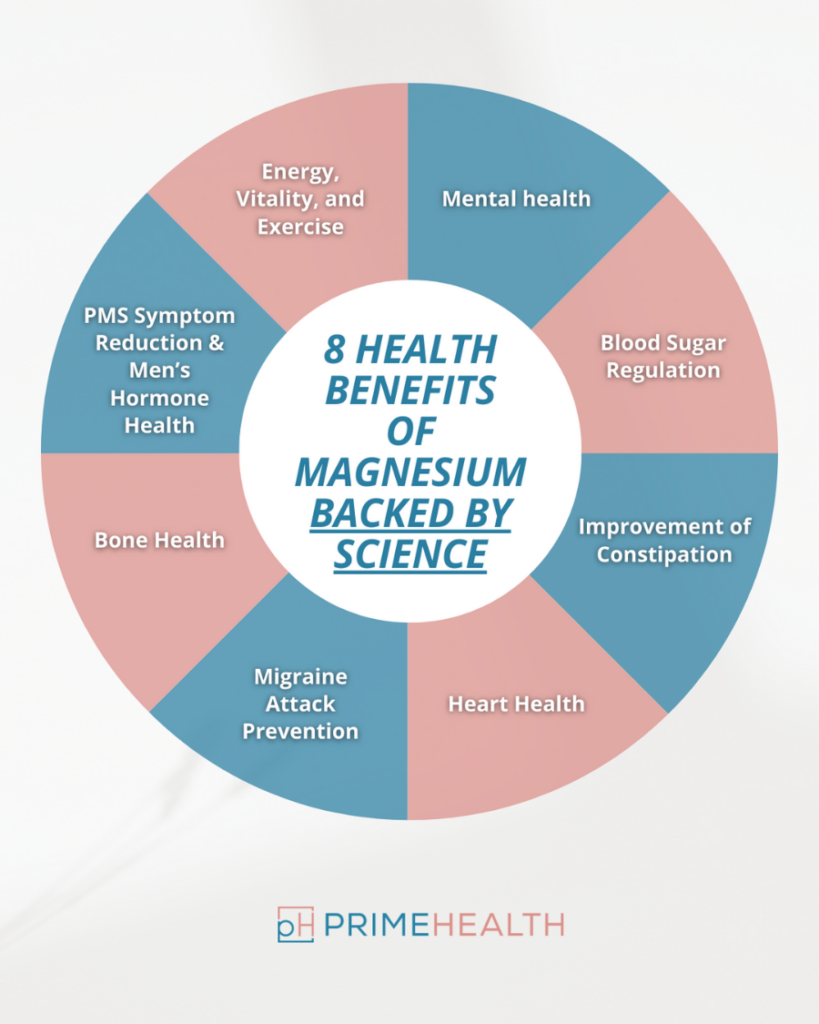Magnesium is an essential mineral that plays a critical role in over 300 enzymatic processes in the human body. Despite its importance, magnesium deficiency is surprisingly common, affecting up to 50% of people in the U.S. and globally. Whether you’re concerned about energy levels, sleep quality, muscle health, or heart function, magnesium is a nutrient you shouldn’t overlook.
In this article, we explore the top benefits of magnesium, signs of deficiency, sources, recommended intake, and tips on how to optimize your magnesium levels for better health and well-being.
What is Magnesium?
Magnesium is a macromineral found naturally in many foods and is also available in supplement form. It is required for a wide range of bodily functions, including:
- Regulating muscle and nerve function
- Supporting immune system health
- Maintaining normal heart rhythm
- Building strong bones
- Managing blood sugar levels and blood pressure
Magnesium is stored primarily in bones, muscles, and soft tissues, with only about 1% circulating in the blood.
Top 10 Health Benefits of Magnesium
1. Supports Heart Health
Magnesium helps regulate heartbeat and blood pressure. It relaxes blood vessels, improves circulation, and reduces the risk of high blood pressure and cardiovascular diseases such as stroke, arrhythmia, and heart attack.
2. Promotes Better Sleep
Magnesium activates the parasympathetic nervous system, the system responsible for relaxation. It helps regulate melatonin, the sleep hormone, and binds to GABA receptors to calm the mind. This makes magnesium a natural solution for people struggling with insomnia or poor sleep quality.
3. Boosts Energy Production
Magnesium is vital for ATP (adenosine triphosphate) production, the main energy source for cells. Without enough magnesium, you may feel fatigued, sluggish, and physically drained.
4. Improves Muscle Function and Recovery
Magnesium helps regulate muscle contractions and prevent cramps. Athletes and active individuals benefit from magnesium’s role in reducing post-workout soreness, muscle tension, and fatigue.
5. Supports Bone Health
While calcium gets most of the attention for bone health, magnesium is just as important. It helps convert vitamin D into its active form, which aids in calcium absorption and bone mineralization. Magnesium deficiency has been linked to osteoporosis and weak bones.
6. Reduces Anxiety and Depression
Studies suggest that magnesium has a calming effect on the brain and may help reduce symptoms of anxiety and mild to moderate depression. Low magnesium levels have been associated with increased risk of mood disorders.
7. Helps with Blood Sugar Control
Magnesium supports insulin sensitivity and glucose metabolism. It may help prevent type 2 diabetes or manage blood sugar levels in individuals with diabetes.
8. Relieves Migraines and Headaches
Magnesium has been shown to reduce the frequency and intensity of migraines. It works by preventing the narrowing of blood vessels in the brain and balancing neurotransmitters that influence pain perception.
9. Supports Digestive Health
Magnesium helps relax the muscles in the gastrointestinal tract and supports regular bowel movements. Magnesium citrate or magnesium oxide are often used to relieve constipation naturally.
10. May Reduce Inflammation
Chronic inflammation is a root cause of many diseases. Magnesium has been shown to help lower inflammatory markers like CRP (C-reactive protein), especially in people with magnesium deficiency.

Signs of Magnesium Deficiency
Common signs of low magnesium include:
- Muscle cramps or spasms
- Fatigue or weakness
- Irregular heartbeat
- Insomnia or restless sleep
- Anxiety or irritability
- Headaches or migraines
- Numbness or tingling
If you experience these symptoms, consult a healthcare provider and consider testing your magnesium levels.
Best Food Sources of Magnesium
Magnesium-rich foods include:
- Leafy green vegetables (spinach, kale)
- Nuts and seeds (almonds, pumpkin seeds)
- Whole grains (brown rice, oats, quinoa)
- Legumes (black beans, chickpeas)
- Dark chocolate (70%+ cacao)
- Avocados
- Bananas
- Fatty fish (salmon, mackerel)
Incorporating these foods into your diet can help you maintain optimal magnesium levels.
Recommended Daily Intake of Magnesium
| Group | Daily Requirement |
|---|---|
| Adult men (19–30) | 400 mg |
| Adult women (19–30) | 310 mg |
| Adult men (31+) | 420 mg |
| Adult women (31+) | 320 mg |
| Pregnant women | 350–360 mg |
Source: National Institutes of Health (NIH)
Magnesium Supplements: What to Know
If you’re not getting enough magnesium from diet alone, supplementation may be beneficial. Popular forms include:
- Magnesium glycinate – gentle on the stomach and good for sleep and anxiety
- Magnesium citrate – effective for digestion and constipation
- Magnesium oxide – high magnesium content but less bioavailable
- Magnesium malate – supports energy and muscle pain relief
Always consult a healthcare provider before starting any supplement, especially if you have kidney issues or take medications.
Final Thoughts
Magnesium is a must-have mineral for optimal health. From heart health and energy to better sleep and mood regulation, its benefits are wide-reaching and essential for everyday wellness. Ensuring adequate magnesium intake through a balanced diet or supplements can make a noticeable difference in how you feel and function.
Don’t wait for deficiency symptoms to appear—prioritize magnesium today for a stronger, healthier tomorrow.


